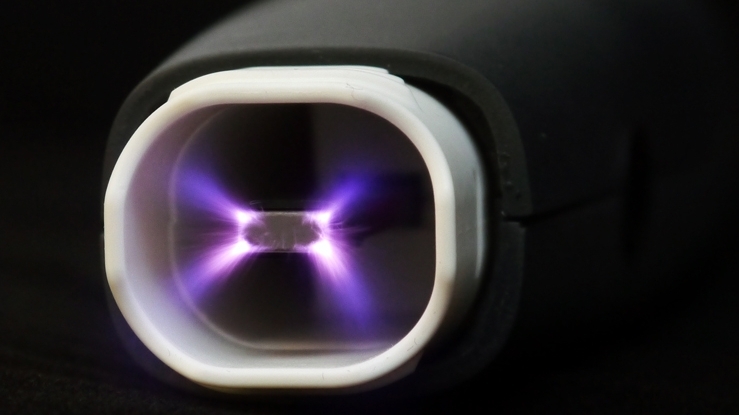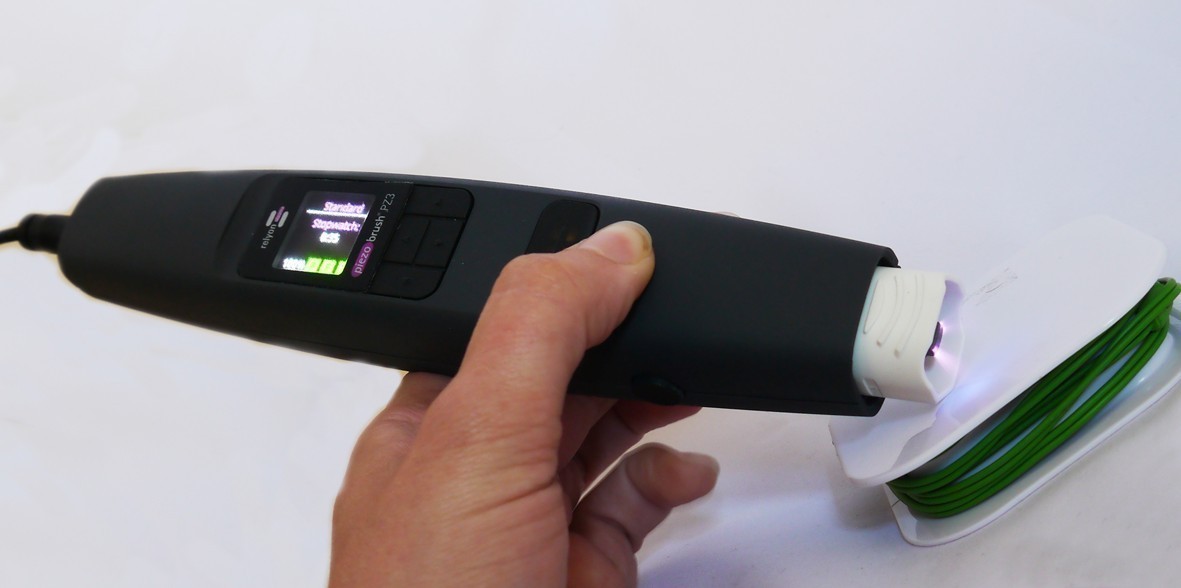Report on a webinar
The product launch of the piezobrush® PZ3, the world's smallest handheld plasma device with PDD® technology, was originally planned for May 7, 2020 at relyon plasma, a subsidiary of TDK Electronics, in Regensburg, Germany. In view of the increasing spread of the coronavirus (Sars-CoV-2), the event was canceled and replaced by a webinar taking place on the same day. This will be reported on below. A detailed description of the piezobrush® PZ3 and its possibilities can also be found in a press release from relyon plasma, which was published in the June issue of Galvanotechnik.
The piezobrush® PZ3 has been developed as a compact handheld plasma device for simple and mobile use in laboratories, pre-development and the assembly of small series. The cold-active plasma is used for the surface treatment of plastics, metals and natural materials in order to significantly improve downstream processes such as bonding, printing, painting or coating. Plasma treatment activates, functionalizes and cleans surfaces. The following points were covered during the webinar:
- Surface treatment with plasma (Corinna Little, Application Technology)
- piezobrush® PZ3 - technology and functions (Florian Hoppenthaler, Head of Design and Production and Project Manager)
- Application examples and live demonstration -first results of the beta testers
- Question & answer session (participants and relyon plasma experts)
As an introduction to the problem, Corinna Little provided information on the basics of surface treatment with plasma. Since the surfaces of components are contaminated with coolants, lubricants, release agents, etc. during processing, even a few monolayers of contaminants can negatively change their surface energy and thus severely impair their wettability and the quality of bonding, painting or printing processes. An untreated surface is characterized by a low surface energy (high contact angle, "round drop"), resulting in insufficient wetting and weak bonding. After treatment with atmospheric pressure plasma, the surface energy is high (low contact angle, "flat drop"), wetting is increased and strong bonding is possible. This can be checked by contact angle measurements or test inks.
Some materials, such as most plastics, have a low surface energy, even when clean. Cold plasma activates these hydrophobic plastic surfaces by generating polar anchor groups or existing groups can be exposed and reactivated by fine cleaning (oxidative removal of thin layers of organic contaminants). Cold plasma can thus improve the wettability of surfaces in order to optimize processes such as bonding, printing, coating, painting, etc.
In the follow-up article, Mr. Florian Hoppenthaler presented the new piezobrush® PZ3 in detail, the world's smallest handheld plasma device with PDD technology. The core element of the device is CeraPlas™, a compact plasma generator: a single piezoelectric component generates high voltage in a very small space and generates a highly efficient cold plasma that can be used for the surface treatment of a wide range of materials such as plastics, metals, glass, ceramics, semiconductors, natural materials and others.
Two interchangeable modules are available for the treatment of electrically non-conductive materials such as plastics ("Standard" module) or conductive materials such as metals ("Nearfield" module). Process control tools and power settings can be accessed via the integrated display. The clear menu navigation of the piezobrush® PZ3 allows convenient fine-tuning of the plasma treatment. The elimination of an external gas supply thanks to the integrated fan and the provision of electrical power via a simple household socket are further advantages of the device. A number of application examples and test results rounded off the presentation.
The company
relyon plasma GmbH, based in Regensburg, is a subsidiary of TDK Electronics AG. Relyon plasma develops innovative plasma systems. True to the motto "rely on plasma", the company sees itself as a professional supplier of plasma systems and service provider for individual customer requirements. Thanks to many years of professional industry experience, relyon plasma now offers a wide range of specialized plasma components for manual applications and inline processes. Atmospheric pressure plasmas, which are generated by electrical discharges in air or other gases, have a remarkable combination of properties that enable unique surface treatment. Such plasmas produce large quantities of highly reactive but short-lived chemical species. These can disinfect, clean, modify and functionalize a wide range of surfaces, preparing them for bonding, painting and printing.






